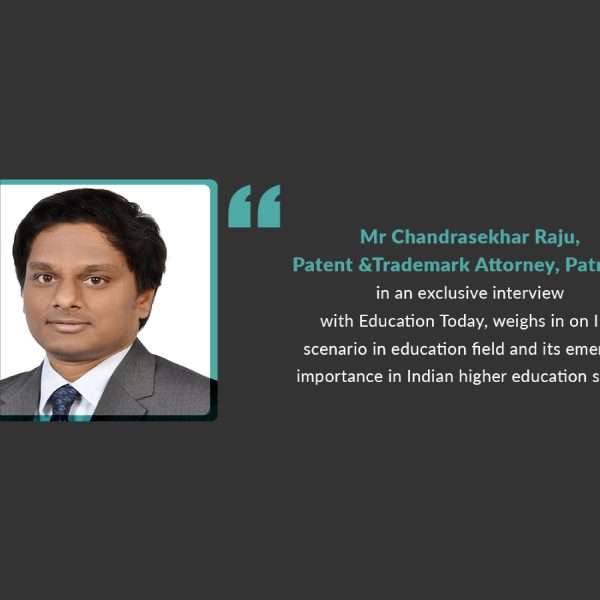Mr Chandrasekhar Raju, Patent & Trademark Attorney, PatnTech, in an exclusive interview with Education TODAY weighs in on IPR scenario in education field and its emerging importance in Indian higher education sector.
What are your thoughts on emerging importance of Intellectual Property Rights in education arena?
Traditionally, awareness of Intellectual Property Rights was limited to higher education institutions such as law schools in India. However, that is changing in recent times. Intellectual property (IP) knowledge is important not only for law students, but for individuals studying business, engineering and technology. IP awareness at an early stage helps students to develop a better understanding of intellectual property, IP rights and their enforceability.
Education institutions and research institutions are among the direct contributors towards innovation and research. However, IP is most commonly used in relation to copyrights i.e., plagiarism of work which gives the students very limited knowledge of IP. Education institutions should focus on teaching importance of IP, different types of IP and the linkage between IP and commercial aspects in relation to success or failure of IP.
What are the biggest intellectual property challenges for Indian education industry?
IP awareness is the biggest challenge in Indian education industry. Not only the students, even the faculty are not aware of the basics of IP. This results in students being unaware of how to protect their IP which they might have developed during their school or college days. IP modules should be introduced in the curriculum to strengthen a multifaceted understanding of IP, to help students contextualise the subject and understand IP from a variety of perspectives.
Please appraise us on PatnTech’s role as education IPR attorney?
PatnTech works with Engineering colleges to help students and faculty to file patent applications in India. We offer a special pricing for educational institutions and students when compared to corporate clients.
What are some IP acts/laws relating educational process?
There are no specific IP laws as such for educational process. IP law is common for all. However, different government bodies governing the education at state or central level adopt IP policies to strengthen IP awareness in educational institutions.
How different is the Indian IP laws vis-à-vis the western world and how does it impact the quality of learning?
Indian IP laws are on par with western world. The difference is in IP awareness, IP protection and enforceability of IP. Indian laws and courts have a long way to strictly implement IP laws.
What are the challenges for an EdTech company in protecting its intellectual property rights?
The biggest problems companies face is not filing patent applications before they disclose their inventions in the public domain or publishing their work in a research paper. EdTech companies should protect their IP to ensure their IP is not copied by others and stay ahead of competition. Most Edtech companies in India are simply replicating business models followed by few successful companies. They should shift focus on how to innovate and stay ahead of competition to bring better practices with use of technology.
As a catalyst fostering original thinking and supporting authentic learning, how you look at the current academic practices in India? what transformations are necessary for traditional academic institutions to remain competitive?
Academic institutions should consider the importance of teaching IP in the curriculum. As IP plays an important role in shaping one’s career and that of a country’s economy, IP ownership and management needs to be given more emphasis in future learning programmes. Further, IP education should go beyond national boundaries. The students should get exposure to global understanding of IP in an international and comparative perspective, promoting exchanges and networking with other universities in India and beyond, to make sure that tomorrow’s creators and people in business will work together to further creativity and scientific progress.
How does PatnTech keep abreast with the ever-changing trends in education technology?
We follow the latest trends in educational technology by analysing the patents filed by major institutions and companies involved in the education sector. Patents provide a heads up as to what is going to come in the market and helps to keep with the market trends.

